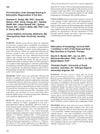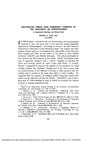
Different stem cells are key for hair growth and health, and understanding their regulation could help treat hair loss.
 May 2016 in “Research opinions in animal & veterinary sciences”
May 2016 in “Research opinions in animal & veterinary sciences” Maternal aspartame consumption during pregnancy leads to skin damage and higher apoptosis in newborn rat offspring.
January 2023 in “Pharmaceutics” AA–TF#15 significantly promotes hair regrowth and could be an effective treatment for androgenic alopecia.
 508 citations,
February 2007 in “Cell”
508 citations,
February 2007 in “Cell” Epithelial stem cells are crucial for tissue renewal and repair, and understanding them could improve treatments for damage and cancer.
 290 citations,
December 2017 in “Journal of The American Academy of Dermatology”
290 citations,
December 2017 in “Journal of The American Academy of Dermatology” Alopecia areata is an autoimmune condition causing hair loss, influenced by genetics, stress, and diet, and may be prevented by a high soy oil diet.
 61 citations,
January 2018 in “Cosmetics”
61 citations,
January 2018 in “Cosmetics” Coffee silverskin may be a beneficial and safe ingredient for cosmetics, offering hydration, firmness, and potential hair growth benefits.
 47 citations,
January 2019 in “Nature communications”
47 citations,
January 2019 in “Nature communications” Polyamines help fix DNA damage accurately in cells.
33 citations,
December 2015 in “International Journal of Molecular Sciences” Melanocyte stem cells are crucial for skin pigmentation and have potential in disease modeling and regenerative medicine.
 25 citations,
September 2013 in “Journal of thoracic oncology”
25 citations,
September 2013 in “Journal of thoracic oncology” Soy isoflavones can protect lung tissue from radiation damage.
 24 citations,
January 2008 in “KARGER eBooks”
24 citations,
January 2008 in “KARGER eBooks” The document concludes that ongoing research using animal models is crucial for better understanding and treating Alopecia Areata.
 20 citations,
December 2019 in “The journal of allergy and clinical immunology/Journal of allergy and clinical immunology/The journal of allergy and clinical immunology”
20 citations,
December 2019 in “The journal of allergy and clinical immunology/Journal of allergy and clinical immunology/The journal of allergy and clinical immunology” Blocking IL-12/IL-23 does not help with hair loss in alopecia areata for mice or humans.
13 citations,
December 2017 in “Stem cells” Low-dose radiation affects hair stem cell function and survival by changing their genetic material's structure.
 11 citations,
October 2021 in “Stem Cell Research & Therapy”
11 citations,
October 2021 in “Stem Cell Research & Therapy” Hair follicle stem cells reduced hair loss and inflammation in mice with a condition similar to human alopecia.
 8 citations,
April 2020 in “Journal of Ethnopharmacology”
8 citations,
April 2020 in “Journal of Ethnopharmacology” Herbs might help with hair loss, but more research is needed to confirm their safety and effectiveness.
 5 citations,
October 2021 in “BioMed Research International”
5 citations,
October 2021 in “BioMed Research International” Noncrosslinked hyaluronic acid helps human hair cells grow and could be a potential hair loss treatment.
9 citations,
January 2022 in “Biology” Male mice are more susceptible to autism-like changes from valproic acid than female mice.
 January 2023 in “Burns & Trauma”
January 2023 in “Burns & Trauma” The study concluded that the new wound model can be used to evaluate skin regeneration and nerve growth.
 April 2015 in “Plastic and Reconstructive Surgery”
April 2015 in “Plastic and Reconstructive Surgery” TLR3 activation helps improve skin and hair follicle healing in mice.
 61 citations,
April 2014 in “Radiation Research”
61 citations,
April 2014 in “Radiation Research” RTA 408 cream protects mice from radiation skin damage.
 16 citations,
March 2013 in “JAMA Dermatology”
16 citations,
March 2013 in “JAMA Dermatology” A cancer drug called nilotinib might cause hair loss due to inflammation around hair follicles.
 9 citations,
September 1947 in “Archives of dermatology and syphilology”
9 citations,
September 1947 in “Archives of dermatology and syphilology” Electrolysis is better for permanent hair removal with less scarring.
 2 citations,
July 2013 in “Veterinary dermatology”
2 citations,
July 2013 in “Veterinary dermatology” Dog skin with hair loss, when transplanted to mice, regrew hair, suggesting the hair loss cause is likely body-wide, not skin-specific.

A high-fat diet caused severe health problems in female macaques but was reversible with a normal diet, while male macaques reacted differently.
 July 2023 in “Research Square (Research Square)”
July 2023 in “Research Square (Research Square)” Skin's uneven surface and hair follicles affect its stress and strain but don't change its overall strength, and help prevent the skin from peeling apart.

Higher EULAR/ACR scores in SLE patients predict more organ damage.
 June 2023 in “Frontiers in Bioengineering and Biotechnology”
June 2023 in “Frontiers in Bioengineering and Biotechnology” The conclusion is that accurately replicating the complexity of the extracellular matrix in the lab is crucial for creating realistic human tissue models.
 June 2022 in “International Journal of Advanced Research in Science, Communication and Technology”
June 2022 in “International Journal of Advanced Research in Science, Communication and Technology” The herbal shampoo promotes hair growth and strength without damage.
 1 citations,
November 2023 in “iScience”
1 citations,
November 2023 in “iScience” A protein called desmoglein 3 is important for keeping hair follicle stem cells inactive and helps in their regeneration.
May 2024 in “Regenerative Therapy” Dendrobium officinale polysaccharide helps hair growth by activating the WNT signaling pathway.
 37 citations,
February 2013 in “Maturitas”
37 citations,
February 2013 in “Maturitas” Testosterone therapy is beneficial for women's health and does not cause masculinization or liver damage, and it protects the heart and breasts.

























